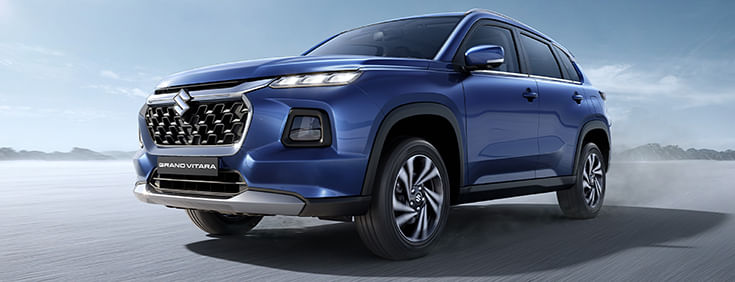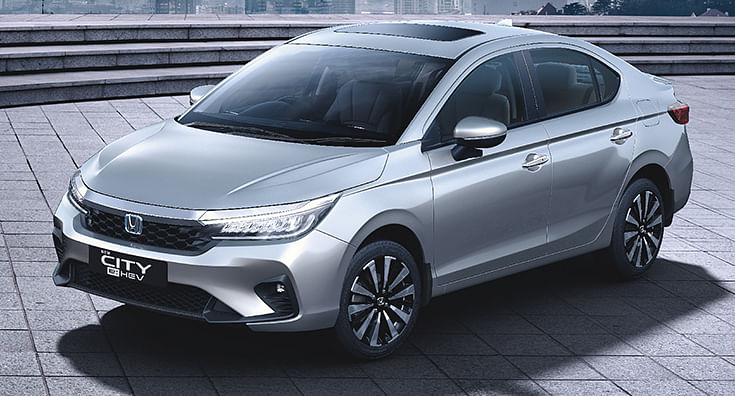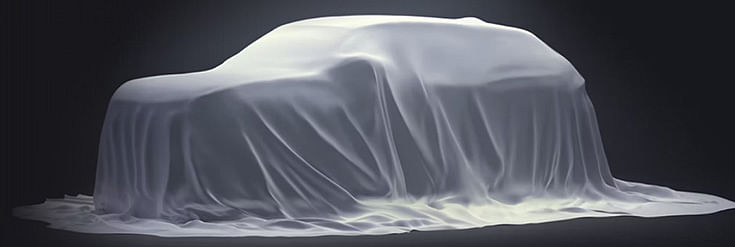Toyota India commands 80% share of strong hybrid car and SUV market
Of the 8,754 strong hybrid technology-equipped passenger vehicles sold in April 2025, Toyota Kirloskar Motor accounted for 7,007 units in the form of the Innova Hycross, Hyryder, Vellfire and Camry. Maruti Suzuki, which has the Grand Vitara and Invicto, sold 1,657 units for a 19% share and Honda Cars India chipped in with 90 City sedans for the remaining one percent.
In India’s passenger vehicle market, the three OEMs with strong hybrid models – Toyota Kirloskar Motor, Maruti Suzuki and Honda Cars India – are witnessing growing demand for their seven such models which are powered by the combination of a petrol engine and an electric motor – with the setup being called a hybrid powertrain. While Toyota has three four (Innova Hycross and Vellfire MPVs, Urban Cruiser Hyryder midsize SUV, and Camry Hybrid sedan), Maruti Suzuki has two (Invicto MPV and Grand Vitara midsize SUV), and Honda one (City e:HEV sedan).
Offering the flexibility and ease of use of a traditional IC engine car but with the benefits of electrification, hybrids are the ideal compromise for high-mileage vehicles as they deliver handsome fuel efficiency.
Autocar India defines strong hybrid vehicles as those which “consist of a combustion engine and an electric motor that work together as well as independent of each other.” There are various types of a hybrid powertrain – series hybrid, parallel hybrid, or the more commonly used series-parallel hybrid system. It is in the latter that the electric motor can power the car in certain scenarios like low-speed city driving, but when the driver demands more pace, the engine comes to life to not just take the duty of driving the wheels, but also charging the battery. The shuffling between the engine and electric drive is decided by the set-up itself, and it helps in leveraging excellent fuel efficiency figures. For instance, the Toyota Urban Cruiser Hyryder claims a fuel efficiency of 27.97kpl, which is an impressive number for a midsize SUV.
Hybrid vehicle technology has traditionally been the first choice of a passenger vehicle buyer, the impediments being the high purchase cost, lack of government subsidies (as opposed to electric vehicles) as well as them being perceived not as ‘green’ as their zero-emission counterparts as they still deploy and reply on internal combustion. In India, while Tata Motors, Mahindra & Mahindra and, more recently, Hyundai and Kia have taken the pure electric route, both Toyota and Maruti Suzuki, which will launch their first EVs in India later this year, preferred to take the hybrid technology route.
 Toyota India, which is witnessing strong demand for its strong hybrid Innova Hycross MPV, Hyryder midsize SUV and the Camry, sold 7,007 units in April 2025, up 128% YoY. Maruti Suzuki had a 19% share with 1,657 units of the Grand Vitara and Invicto, while Honda sold 90 City sedans with this tech.
Toyota India, which is witnessing strong demand for its strong hybrid Innova Hycross MPV, Hyryder midsize SUV and the Camry, sold 7,007 units in April 2025, up 128% YoY. Maruti Suzuki had a 19% share with 1,657 units of the Grand Vitara and Invicto, while Honda sold 90 City sedans with this tech.
As per retail sales data available on the Vahan portal, April 2025 registered sale of 8,663 strong hybrid models, a big jump of 181% year on year (April 2024: 3,079 units). Leading the charge is Toyota India with 6,930 units, which has a commanding 80% share of this market, followed by Maruti Suzuki (1,644 units and 19% share) and Honda Cars India (89 units and 1% share).
In April 2025, Toyota has carried over the same momentum it displayed in FY2025, when it sold 67,883 strong hybrids and commanded an 82% market share, while Maruti Suzuki sold 13,829 units for a 17% share, and Honda sold 987 City sedans for a 1% share.
 The Urban Cruiser Hyryder hybrid packs Toyota’s 92hp, 122Nm, 1.5-litre, 3-cylinder petrol engine coupled with a hybrid system that comprises a 0.76kWh lithium-ion battery pack and an electric motor.
The Urban Cruiser Hyryder hybrid packs Toyota’s 92hp, 122Nm, 1.5-litre, 3-cylinder petrol engine coupled with a hybrid system that comprises a 0.76kWh lithium-ion battery pack and an electric motor.
HYBRIDS CENTRAL TO TOYOTA'S MULTI-FUEL SUSTAINABILITY STRATEGY
Think hybrid tech and Toyota and the Prius – the world’s first hybrid vehicle which went on sale in 1997 – come to mind. For the Japanese car and SUV maker, hybrid vehicles are central to its multi-pronged sustainable motoring strategy and includes petrol, diesel, CNG, hybrids and EVs. At the recent Autocar Professional Future Powertrain Conclave held in Chennai on March 26 held in Chennai, Vikram Gulati, EVP and Head, Corporate Affairs and Governance, Toyota Kirloskar Motor, said, “The future is electrified but not electric alone. Every market has its journey. What matters is the collective shift away from fossil fuels towards technologies that are sustainable, scalable, and suited to the local context.”
In April 2025, TKM sold 7,007 units of these two eco-friendly models, which makes for handsome 128% YoY growth (April 2024: 3,076 strong hybrids), and commanded an 80% share of the total 8,754 strong hybrid PVs sold in India.
In FY2025, Toyota Kirloskar Motor sold a record 309,230 passenger vehicles including 258,537 utility vehicles. TKM’s best-selling UVs last fiscal were the Innova MPV (107,204 units) and the Hyryder (60,388 units). The key contributors to these two models’ growth were their strong hybrid versions. Despite the higher price-tag for the six-variant Innova Hycross range, which starts at Rs 26.31 lakh through to Rs 31.34 lakh for the top-end ZX(O), compared to the Crysta’s price range (Rs 19.09 lakh to Rs 21.30 lakh), the Hycross has been outselling the more affordable Innova Crysta.
The Hycross’ cousin, the Urban Cruiser Hyryder hybrid packs Toyota’s 92hp, 122Nm, 1.5-litre, 3-cylinder petrol engine coupled with a hybrid system that comprises a 0.76kWh lithium-ion battery pack and an electric motor. With this hybrid setup, the total power output is 116hp. The mileage is rated at 27.7kpl. Pricing for the 11-variant Hyryder Strong Hybrid equipped with a e-CVT starts at Rs 16.81 lakh and goes up to Rs 20.19 lakh for the top-end variant. Compare this with the 20-variant-strong petrol Hyryder (starting at Rs 11.34 lakh through to Rs 19.14 lakh) or the two CNG Hyryders priced at Rs 13.81 lakh and Rs 15.84 lakh. All prices are ex-showroom, Mumbai.
Then there’s the XXL-size luxurious Toyota Vellfire, which proves that even a very high sticker price cannot dissuade buyers. Priced at Rs 1.38 crore (on-road Delhi), the XL-sized MPV sold 1,155 units – 755 additional units than FY2024’s 400 units. A sister product to the even more luxuriously appointed Lexus LM, the Vellfire is powered by a 193hp, 240Nm, 2.5-litre, four-cylinder petrol-hybrid powertrain mated to an e-CVT.
The Camry, which is Toyota’s sole sedan on sale in India and sold here since 2002, is in its seventh-generation avatar assembled at the plant in Bidadi, Karnataka. The latest Camry, launched in December 2024, is powered by a more powerful but more frugal strong hybrid powertrain which delivers an ARAI-certified fuel efficiency figure of 25kpl – that is as much as a Maruti Dzire in a much bigger car.
The 2.5-litre four-cylinder petrol engine develops 187hp at 6000rpm and 221 NM torque. When paired with a 136hp, 208 Nm electric motor, its total output is 230hp, 12hp more than its predecessor. Toyota claims a 0-100kph time of 7.2 seconds.
Adding heft to its hybrid vehicles portfolio, Toyota Kirloskar Motor will, later this year, launch its first EV – the Urban Cruiser EV – which will be manufactured at the Suzuki Motor Gujarat plant.
 The Maruti Grand Vitara is equipped with the Toyota Hybrid System.
The Maruti Grand Vitara is equipped with the Toyota Hybrid System.
MARUTI MAKES GRAND VITARA STRONG HYBRID MORE AFFORDABLE
In FY2025, the Grand Vitara midsize SUV was the fourth highest-selling UV for Maruti Suzuki with 123,946 units and the Invicto MPV (4,036 units) its lowest-selling UV. The company, which was the largest selling UV OEM last fiscal, clocked retail sales of 13,828 units of the strong hybrid variants of these two models which gave it a 17% share of this segment.
In April 2025, as per Vahan, Maruti has sold 1,657 units of these two models both of which are equipped with the Toyota Hybrid System (THS). Most of these sales would have been of the Grand Vitara.
Like Toyota, Maruti Suzuki too will be entering the electric vehicle market with its e-Vitara
In fact, last month, in an effort to rev up sales of the Grand Vitara, Maruti Suzuki updated the Grand Vitara in early April with a new strong hybrid variant, more features across the board, six airbags as standard and an automatic transmission option for the AWD variants. Prices for the 2025 Grand Vitara start from Rs 11.42 lakh (ex-showroom, Delhi). Maruti has introduced a new Delta+ trim for the strong hybrid powertrain, making it a little more accessible. Previously, this powertrain was offered only with the top-spec Zeta+ and Alpha+ trims at prices starting from Rs 18.58 lakh (ex-showroom). The new Delta+ strong hybrid lowers that entry price to Rs 16.99 lakh.
Compared to the Grand Vitara, demand for the Invicto MPV, which is produced by Toyota Kirloskar Motor for Maruti Suzuki under the global Suzuki-Toyota alliance, has been tepid. The Invicto sold 4,036 units in FY2025, down 12% YoY (FY2024: 4,599 units) and was among the six of the eight Nexa models which saw a sales decline in FY2025.
 The Honda City e:HEV's petrol-electric hybrid engine delivers 27.13kpl.
The Honda City e:HEV's petrol-electric hybrid engine delivers 27.13kpl.
HONDA CITY e:HEV BANKS ON HIGH EFFICIENCY
In FY2025, Honda Cars India clocked wholesales of 10,901 units of the City, which is the sole sedan in India equipped with a strong hybrid powertrain. Retail sales of this variant, as per Vahan data, were 987 units. In April 2025, this variant has sold 90 units, giving Honda a similar one percent share of this sub-segment of the overall PV market.
Compared to the petrol-engined City, which is priced at Rs 13.87 lakh (on-road Mumbai), the 1.5 i-VTEC e:HEV ZX, which costs Rs 24.03 lakh (on-road Mumbai), is expensive but the fuel economy is exceptional. While the City Petrol's engine mileage starts at 17.8kpl and goes up to 18.4kpl, the City Petrol-Electric Hybrid engine delivers 27.13kpl.
 Maruti Suzuki will be expanded its strong hybrid vehicle line-up with a 'greener' version of its premium Fronx compact SUV.
Maruti Suzuki will be expanded its strong hybrid vehicle line-up with a 'greener' version of its premium Fronx compact SUV.
NEW STRONG HYBRID VEHICLES IN THE OFFING
Given the success of the Grand Vitara midsize SUV and its strong hybrid avatar, Maruti Suzuki India is understood to be working on the launch of a seven-seater version of this variant. The upcoming Fronx compact SUV, which was the third highest-selling UV for the company n FY2025 (166,216 units), is also to benefit from a strong hybrid variant. Interestingly, the Fronx facelift will be the first model to get Maruti's in-house series hybrid tech that is expected to be significantly cost effective due to its lesser complexity, as compared to the series-parallel hybrid system in the company’s existing models. The Z12E engine that debuted on the new Swift hatchback will be coupled with strong hybrid tech will power the ‘greener’ Fronx. Future models, including the next-gen Baleno, will also benefit from this setup.
Given the Toyota-Suzuki model sharing alliance, there will also be a seven-seater Urban Cruiser Hyryder, the three-row version of the Hyryder, which will share its underpinnings with the seven-seat Grand Vitara.
Meanwhile, last month, at its 2025 Investor Day, Korean carmaker Kia confirmed that it has a new hybrid powertrain for its Seltos midsize SUV and slated to debut in the next-generation model in the second half of CY2025.
GROWTH OUTLOOK FOR HYBRIDS IN INDIA
In India’s SUV-powered passenger vehicle market, which will see a clutch of new EVs being launched in FY2026, hybrids will continue to have a presence albeit in the absence of governmental subsidies their growth compared to EVs will be lower.
However, there could be some hope on the horizon for hybrid vehicles in India. The Delhi government, recently, has drafted its EV Policy 2.0 which proposes extending benefits like tax waivers currently offered to all-electric vehicles to hybrids. It is understood that that the proposal could exempt hybrid cars and SUVs, priced up to Rs 20 lakh, from registration and road tax in Delhi.
This proposal, though, seem to have come in the crosshairs of the main passenger vehicle manufacturers – Tata Motors, Mahindra & Mahindra and Hyundai – which have invested heavily in developing battery electric vehicles. According to automakers, this policy could dilute the focus on full electrification, potentially discouraging investment in BEV technologies. Many believe that if Delhi takes the lead, other states may follow, which could undermine the momentum for developing a robust all-electric vehicle ecosystem. Uttar Pradesh was the first to waive these charges for hybrid vehicles in July 2024, a move that attracted criticism from some carmakers back then as well.
Nevertheless, till the time the country achieves a truly widespread and efficient EV charging network and infrastructure, there will always be a category of car and SUV vehicle buyers who prefer to keep the vexing issue of EV range anxiety behind them and revel in the comfort of the ability to ‘shift’ on the fly without falling short of gas. According to Toyota Kirloskar Motor’s Gulati, “Hybrids are registering growth in major markets. It is a technology that is clean, practical, and offers a green as well as convenient mobility solution to the consumer.”
With inputs from Autocar India
ALSO WATCH: Panel Discussion | Hybrids as a transition to electrification | Future Powertrain Conclave
RELATED ARTICLES
Top 10 MPVs in First 10 Months of FY2026: Maruti Ertiga to Kia Carnival
Demand for multi-purpose vehicles remains strong, with their share of UV sales rising to 17% in FY2027 from 11% in FY202...
Skoda Slavia and VW Virtus Sales Cross 150,000 Units, Virtus First to Cross 75,000 Units
Skoda Volkswagen India’s two MQB-A0-IN–based sedans have reached a new milestone, with the Slavia at 73,378 units and th...
Renault Triber Sales Cross 200,000 Units in India; Facelifted Model Spurs Demand
Launched in August 2019, the seven-seater Triber has sold 200,253 units in India and 34,238 overseas. The facelifted Jul...






 07 May 2025
07 May 2025
 21841 Views
21841 Views





 Ajit Dalvi
Ajit Dalvi


 Autocar Professional Bureau
Autocar Professional Bureau


